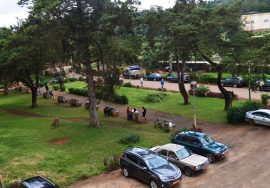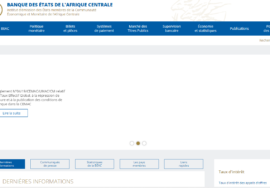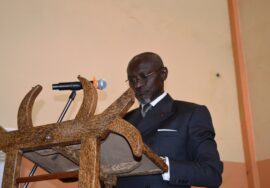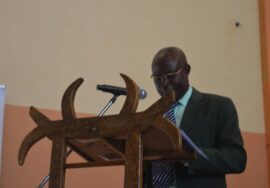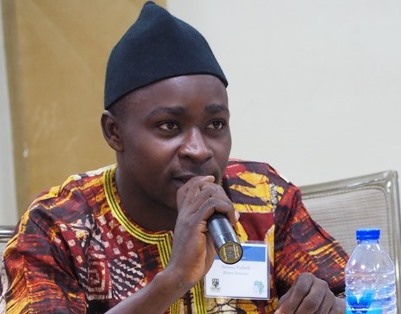
UDs student excels at the APN
Mr Delmas Tsafack backs grant
Dschang-UDS/SIC-12/07/17. The University’s exploits has been felt worldwide through the prowess of its students in their scientific works. Mr Tsafack Delmas has joined a host of remarkable laureates that have made the university proud. The student of the department of History is the youngest and first in the CEMAC Zone to back an APN grant (African Peace building Network).
SIC/UDs: Mr. Delmas Tsafack you have been awarded the competitive program the African Peace building Network (APN) Individual Research Grant from the Social Sciences Research Council (SSRC). You are the youngest and the first in the CEMAC Zone to have benefitted from it. What have you to say to those who would like to know more about you beyond such distinction?
Delmas: Thanks very much to the University of Dschang for its interest on what I am doing in my research life. I am a researcher in History and International Relations; I graduated from the Department of History of the University of Dschang. My research interests include History and foreign policy of Equatorial Guinea, Foreign policy of small states and regional integration. I have extensively researched on the history of Equatorial Guinea. I have been selected among more than 300 submissions for the 2017 cohort of the African Peacebuilding Individual (APN) Research Grant of the Social Science Research Council (SSRC) of New York. So I am one of the 16 grantees selected by the highly selective program. The topic of my research proposal is “Institutionalized Violence and crime in Equatorial Guinea”
SIC/UDs: What program are you partaking in? What is its importance / and what role are you to play?
Delmas: The African Peacebuilding Network (APN), launched in March 2012 supports independent African research on conflict-affected countries and neighboring regions of the continent. The APN promotes the visibility of African knowledge to the global community. It invites research grant applications from African researchers, policy analysts and practitioners working on conflict and peacebuilding issues at universities and research institutions or regional governmental and nongovernmental organizations in Africa. APN funds research on diverse field including prevention of mass atrocities. Mine is focused on violence and crime in Equatorial Guinea since the independence of this Central African state. The APN Individual Research Grant for which I am a grantee, awards on a competitive peer-reviewed basis and intend to support six months of field-based research from June 2017 to December 2017. I will travel to Spain and Equatorial Guinea for one month in each country to make archival research on the history of institutionalized violence in Equatorial Guinea since 1968. At the end of my grant, I am supposed to produce a high quality and internationally visible paper on my research topic that will be published in an international peer-reviewed journal or platform. During my grant period, I will be advised by a mentor and attend two methods workshops in two African countries. The first training workshop took place from June 20 to 22, 2017 at Accra, Ghana. It was an occasion to participate in lectures on refining our research focus, writing, and methodologies. The second that will take place in December will help us to have strategies of disseminating our results. Both of the workshops also encourage us to connect our project with multiple peacebuilding constituencies in Africa and beyond.
SIC/UDs: What are your impressions as a laureate of the competitive program of APN?
Delmas: As an APN grantee, I am very happy because it was not easy to be nominated. I was in competition with many university lecturers and professors and emerge to be part of the 16 selected for the 2017 cohort. APN opens you a wide range of research and networking opportunities in the world. Alumni of this program are among the best in their community and as a young scholar, I can just be very happy of my nomination and hope I will present high quality findings at the end of the award.
SIC/UDs: What will be your prospects be after this program?
Delmas: After this program, I am planning, a part of the paper to be published in peer-reviewed journals, to publish a book on institutionalized violence in postcolonial Africa especially in Equatorial Guinea. My book is going to set up theoretical framework to study institutionalized violence in Africa.
SIC/UDs: Thank you for answering our questions Mr. Delmas Tsafack! One last word?
The last word I can say is that young scholars should work very hard to be excellent in the highly competitive world of research. It is not easy to be a researcher in our context with no funds to support research projects. I am also opened to those young scholars as me who want to emerge. I am available to discuss with them about my research experience especially with students of the University of Dschang where I am graduated. Thank you very much for your invitation to talk about my APN IRG./
Interviewed by LBP
